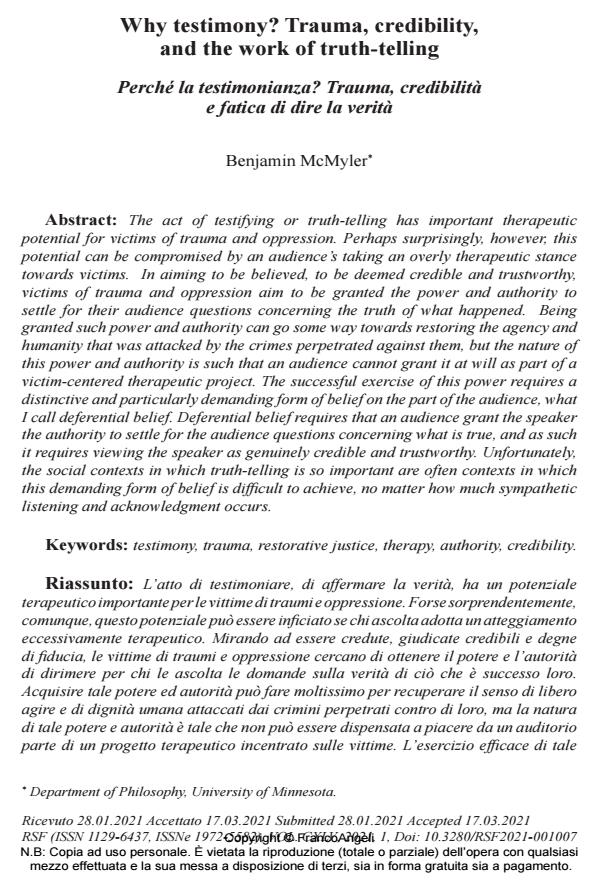Perché la testimonianza? Trauma, credibilità e fatica di dire la verità
Journal title RIVISTA SPERIMENTALE DI FRENIATRIA
Author/s Benjamin McMyler
Publishing Year 2021 Issue 2021/1
Language English Pages 22 P. 119-140 File size 180 KB
DOI 10.3280/RSF2021-001007
DOI is like a bar code for intellectual property: to have more infomation
click here
Below, you can see the article first page
If you want to buy this article in PDF format, you can do it, following the instructions to buy download credits

FrancoAngeli is member of Publishers International Linking Association, Inc (PILA), a not-for-profit association which run the CrossRef service enabling links to and from online scholarly content.
The act of testifying or truth-telling has important therapeutic potential for victims of trauma and oppression. Perhaps surprisingly, however, this potential can be compromised by an audience’s taking an overly therapeutic stance towards victims. In aiming to be believed, to be deemed credible and trustworthy, victims of trauma and oppression aim to be granted the power and authority to settle for their audience questions concerning the truth of what happened. Being granted such power and authority can go some way towards restoring the agency and humanity that was attacked by the crimes perpetrated against them, but the nature of this power and authority is such that an audience cannot grant it at will as part of a victim-centered therapeutic project. The successful exercise of this power requires a distinctive and particularly demanding form of belief on the part of the audience, what I call deferential belief. Deferential belief requires that an audience grant the speaker the authority to settle for the audience questions concerning what is true, and as such it requires viewing the speaker as genuinely credible and trustworthy. Unfortunately, the social contexts in which truth-telling is so important are often contexts in which this demanding form of belief is difficult to achieve, no matter how much sympathetic listening and acknowledgment occurs.
Keywords: Testimony, trauma, restorative justice, therapy, authority, credibility.
- Understanding Albanian Sex Trafficking as a Crime Against Humanity Alex Rochester, pp.45 (ISBN:978-3-031-51193-6)
- The development and protocol for testing a co-created digital intervention (Sentinel) to improve mental wellbeing and help manage and prevent trauma in first responders. (Preprint) Nicola Cogan, Alison Kirk, Christoph Graf, in JMIR Research Protocols /2025
DOI: 10.2196/72250
Benjamin McMyler, Why testimony? Trauma, credibility, and the work of truth-telling in "RIVISTA SPERIMENTALE DI FRENIATRIA" 1/2021, pp 119-140, DOI: 10.3280/RSF2021-001007